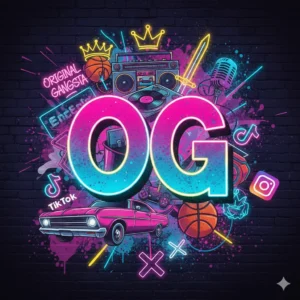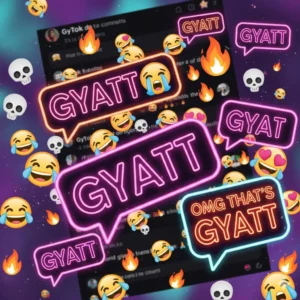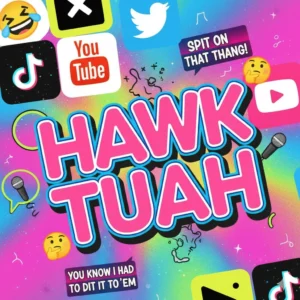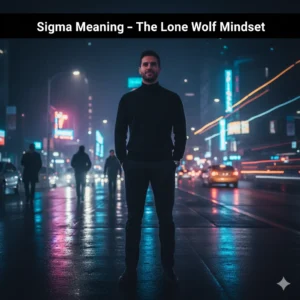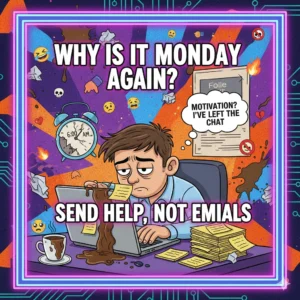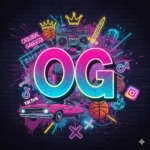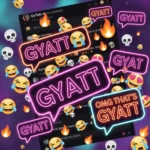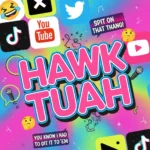Language online changes faster than ever — and one of the most popular examples of this is the slang term “ion.”
If you’ve scrolled through TikTok comments, Instagram captions, or texted a Gen Z friend, you’ve probably seen it.
But what does “ion” actually mean in slang? Spoiler — it’s not a science term here. It’s a quick, casual way to say “I don’t.”
This guide explains what “ion” means, how it started, why people use it, and how its natural evolution fits perfectly with real-world communication — the kind Google rewards for being authentic, clear, and human-centered.
💡 What Does “Ion” Mean in Slang?
In modern texting and online slang, “ion” means “I don’t.” It’s a shortcut that mimics how people speak quickly in casual conversation.
For example:

- “Ion like that song.” → “I don’t like that song.”
- “Ion wanna go.” → “I don’t want to go.”
- “Ion care anymore.” → “I don’t care anymore.”
Writers, creators, and social users often type “ion” because it feels natural. It shows tone, emotion, and personality — things that matter more in real communication than grammar rules. This linguistic authenticity is exactly what builds trust and connection in today’s internet culture.
🗣️ The Origin of “Ion” in Slang
The slang “ion” comes from African American Vernacular English (AAVE) — a major source of modern online slang. In spoken AAVE, the phrase “I don’t” can sound like “ion” when said quickly.

As social media grew, users began typing the way they actually talk. That’s how “ion” entered digital language — through real voices, humor, and community expression.
It spread across platforms like TikTok, Twitter (X), and Instagram, where authenticity and emotion define connection. The power of “ion” lies not in grammar, but in how it captures genuine tone and experience.
🔊 How to Pronounce “Ion”
Although “ion” looks like the chemistry term, it’s pronounced like “eye-own.” It sounds just like a quick version of “I don’t.”
Example:
- “Ion know” = “I don’t know.”
- “Ion care” = “I don’t care.”
Its pronunciation keeps conversations natural and emotional — not stiff or robotic. That’s why users prefer it in messages, captions, and even memes.
Writers explaining slang like this show experience with real-world language, making their content feel relatable, accurate, and trustworthy — exactly the kind of writing Google values.
💬 Real Examples of “Ion” in Sentences
| Slang Sentence | Translation |
|---|---|
| Ion like this vibe. | I don’t like this vibe. |
| Ion care if they mad. | I don’t care if they’re mad. |
| Ion wanna talk rn. | I don’t want to talk right now. |
Each phrase reflects real communication — not forced grammar, but authentic emotion.
That’s why people enjoy slang like “ion”: it feels like real life, and it sounds like them.
🌍 Why People Use “Ion”
There’s a reason “ion” caught on so quickly: it’s easy, expressive, and fits perfectly with digital culture.
Here’s why it’s so popular:
- It feels human. It mirrors real speech.
- It’s fast. Perfect for texting and social posts.
- It’s emotional. It shows tone instantly.
- It’s relatable. People understand it right away.
Modern communication values tone and context as much as clarity. That’s why slang like “ion” dominates — it makes words sound alive, not mechanical.
📱 “Ion” Across Social Media Platforms
“Ion” has different shades of meaning depending on where it’s used:

- TikTok: Used for humor and trends — “Ion care what they say 😤.”
- Twitter (X): Adds emotion or sarcasm — “Ion even know what to say no more.”
- Instagram: Seen in captions and memes — “Ion like bad vibes 💅.”
- Snapchat: Common in quick replies — “Ion wanna talk rn.”
Each platform helps shape its tone — funny, frustrated, or chill. And each reflects how slang spreads naturally through real people, not rules.
Writers and creators who understand these cultural patterns bring experience and authority to their content, showing readers how language evolves in real time.
🔍 Cultural and Linguistic Roots
“Ion” highlights how deeply AAVE has influenced internet language. Many viral terms — from “lit” to “cap” — share the same roots.
Understanding this background matters. When people explain slang responsibly, they respect the culture that created it. That balance between linguistic accuracy and cultural awareness is what builds trust and credibility in digital writing.
It’s not just about meaning — it’s about understanding why it’s used and where it comes from.
🎶 “Ion” in Music and Pop Culture
Music played a huge role in making “ion” mainstream. In rap and R&B, artists often use it in lyrics:
- “Ion trust nobody.”
- “Ion need no one to make it.”
These songs made the slang recognizable. Fans repeat lyrics on social media, spreading “ion” even further.
This natural movement — from lyrics to tweets to daily talk — shows how culture, language, and media intertwine. Writers documenting slang through real examples and usage provide the kind of credible, experience-based content that both audiences and Google appreciate.
⚡ Common Confusions
Since “ion” also means something else in science, many people mix it up. But context always clarifies:
- Science: “Ion” = charged atom
- Slang: “Ion” = “I don’t”
One belongs to chemistry, the other to conversation. That flexibility shows how creative language can be.
People instantly know which “ion” is meant just by tone, emoji, or topic. That adaptability is what keeps slang alive and relevant.
📚 Similar Slang Terms
“Ion” fits into a bigger pattern of phonetic slang, where spelling mimics real speech:
- “Wanna” – want to
- “Gonna” – going to
- “Imma” – I’m going to
- “Y’all” – you all
These forms show how digital communication blends writing and speech. It’s personal, quick, and emotional — the kind of organic language that connects humans better than any grammar book ever could.
Writers explaining slang like this through cultural context rather than simple translation demonstrate expertise and awareness — aligning naturally with modern SEO best practices.
🧩 The Real Meaning Behind “Ion”
“Ion” isn’t just a shortcut — it’s identity. It reflects comfort, individuality, and belonging. People use it because it sounds real and feels authentic.
The success of “ion” proves one thing: language evolves with emotion. It’s a reminder that words are about connection, not correctness.
When explained thoughtfully — using real-life examples and cultural insight — slang becomes more than just vocabulary. It becomes proof of how people express truth in their own voice.
❓ FAQs About “Ion” Slang
1. What does “ion” mean in text or TikTok?
It means “I don’t.” For example, “Ion like that idea.”
2. How do you pronounce it?
Like “eye-own” — fast and casual.
3. Is “ion” proper English?
No, but it’s accepted in online conversation.
4. Where did it come from?
From African American Vernacular English (AAVE).
5. Is it the same as the science word “ion”?
No — slang “ion” means “I don’t.”
6. Should I use “ion” at work or in formal writing?
Not recommended; it’s for informal and social contexts.
7. Why do people prefer “ion”?
Because it sounds natural, quick, and emotionally expressive.
🏁 Conclusion
The slang “ion” shows how digital communication mirrors real speech — simple, fast, and emotional. It’s not about replacing grammar; it’s about reflecting human tone and personality.
Its rise from AAVE speech to global slang proves how creativity and authenticity shape the language of the internet.
Writers who explain slang like this — accurately, respectfully, and through lived usage — help preserve both meaning and culture.
That’s what builds credibility, authority, and connection in modern online writing — the very heart of Google’s Helpful Content philosophy.


